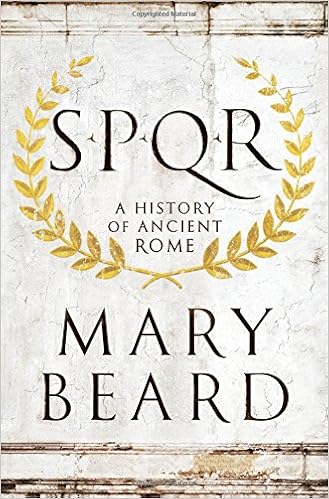I no longer think, as I once naively did, that we have much to learn directly from the Romans--or, for that matter, from the ancient Greeks, or from any other ancient civilisation... But I am more and more convinced that we have an enormous amount to learn--as much about ourselves as about the past--by engaging with the history of the Romans, their poetry and prose, their controversies and arguments . Western culture has a very varied inheritance. Happily, we are not the heirs to the classical past alone. Nevertheless, since the Renaissance at least, many of our most fundamental assumptions about power, citizenship, responsibility, political violence, empire, luxury, and beauty have been formed, and tested, in dialogue with the Romans and their writing.
When Mary Beard's SPQR is described as a "popular history of Ancient Rome," it might be easy to miss the resonances hidden in the acronym: Senatus Populusque Romanus--the Senate and the Roman people. It's a history which is written for the layperson, sure, but Beard's title intentionally draws our attention to that second populus, which is part of what makes the book so engaging. It's not just a story of Great Men--though there are plenty of them here, from Romulus to Cincinnatus to Hannibal to Julius Caesar to Augustus--but also a book that pays special attention to what life was like for the average Roman citizen, who tends to get lost in the historical narrative. What was it like to be a woman in Rome? What about a slave?
That kind of approach can seem like a fuzzy kind of history, one that forsakes the clarity of what happened for the ephemera of domestic life. But Beard makes a clear case that such an approach is necessary if we really want to engage with the problems and ideas that shaped the Roman consciousness over a millennium, and which continue, shadow-like, to inform our own problems and ideas today. The class conflict between the Senate and the plebs, and later the optimates and populares, don't map neatly onto our own class conflicts, but man, are they recognizable. So too the argument about citizenship--who gets to be a Roman, where, and why?--that preoccupied the ancients until universal citizenship was granted in the third century CE have their own echoes in our current political cycle. The preemptive strike which utterly destroyed the city of Carthage in the Third Punic War looms large when we think about our own role as the world's mightiest military, and Beard carefully and consciously wants us to consider what it might have been like to be a Carthaginian.
But SPQR is also filled with those great, faintly familiar stories about power, intrigue, statecraft, and war which are the hallmarks of Edward Gibbon's The History of the Decline and Fall of the Roman Empire. It's fun to read about Cicero railing against the traitor Catiline, even as Beard asks us to consider the hypothesis that Catiline was something of a popular reformer, rather than a venal turncoat. And who doesn't love to hear about the bloody exploits of Nero, who fiddled while Rome burned and bungled the murder of his own mother, even as Beard points out that it's the murdered emperors, on whose perfidy their successors' legitimacy rested, seem to be the worst of the bunch?
SPQR hits a sweet spot for me--it reminds me of the history that I know already, and which fascinates, while prodding me to think in directions I might not have otherwise. It's thoughtful in a way that a "popular history" probably doesn't have to be, and that's what makes it worth reading.


No comments:
Post a Comment